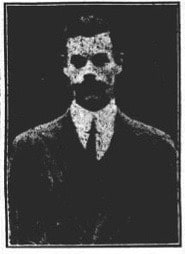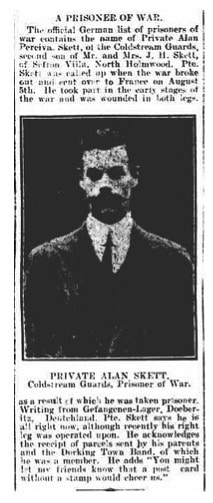Thank you to Jim Edwards from North Holmwood for this research.


Alan Percival Skett was born in Pixham, Dorking early in 1889, but was baptised in St John’s on 7th April. In the 1891 census he was living at Bentsbrook Cottage, North Holmwood with his father Joseph Henry (a gardener) and mother, Mary Ann.
By 1901 the family were in a cottage near The Studio and Boehms Cottage, not far from the church. He was a pupil at Powell Corderoy School, Dorking (then in Vincent Lane). He joined the Militia with the 3rd Battalion Royal West Surrey Regiment on 18th September 1904 with number 3683, while working in Dorking as a shop assistant. He gave his age as 18 years and 9 months and his parents were living in Little Egypt, North Holmwood.
Joseph advertised in the Dorking Advertiser in Nov 1891 for gardening work, as “late Head Gardener, Holmwood Lodge”. Mary frequently advertised for washing and in August 1911 was advertising for a laundry maid to help with work.
Alan joined the Coldstream Guards as number 6055 on 25th January 1905, giving his age as 19, when he was actually just 16. He gave his denomination as Church of England and his occupation as stationer’s assistant. His father and two brothers were living in Sefton Villas (opposite the present fire station). He spent 20 months in home service and then the remainder of his 3 years’ service with the colours in Egypt, before returning home and transferring to the reserve on 31st January 1908. (Unlike most other regiments soldiers in the Guards served three years with the colours and nine years on the reserve at this time.)
By July 1908 he was back in Dorking, working as a relief postman. In 1911 he was working as a gardener living in the family cottage, with his two brothers, Ernest Edward, 29, a postman and Walter Harold, age 12. His father, now a retired head gardener, was living a few doors away in Sefton Villas with Mary and one daughter. Alan was a member of the town band.
The Guards were preparing for war before the declaration on 4th August and as a reservist Alan was recalled on 6th August, equipped and sent to France, landing at Le Havre, with 3rd Battalion Coldstream Guards, on 12th August 1914. The battalion arrived near the front on 20th August and then started a period of marching from one area to another, digging in and then moving again, sometimes to where it had just come from, with considerable confusion. The weather was very hot and the long days marching, with little water, were very tiring. The reservists who had been recalled had not had time to regain their fitness and found it particularly difficult.
After the Battle of Mons on 23rd August the British and French Armies started to withdraw. On 25th August the battalion first engaged the enemy. The battalion was in billets in the village of Landrecies. In the afternoon a few German cavalry had briefly appeared as neither side knew the position of the other. One company then took up a defensive position North West of the village, across the river. They were approached during the evening by a party which appeared to be French troops, but which in fact were German with a few men in French uniforms at the front according to the War Diary. Later histories suggest this was a misidentification of the uniforms, with the Germans who were wearing caps rather than helmets being mistaken for French. In the ensuing fighting the battalion suffered 124 casualties.
On 1st September the battalion, as part of the 4th Guards Brigade, was involved in the Battle of Villers Cottérêts. It was covering the retreat from the north through the Retz Forest to this village at the southern edge. At one stage according to the war diary a cart drove up to their position, apparently containing civilian refugees. The refugees suddenly fled the cart, from which a German machine gun opened fire at close quarters. No casualties were caused. The forest had many intersecting rides and the troops became divided into small parties. The situation was very confused and the Germans at times were firing on their own forces. The battalion casualties were relatively light, compared with earlier fighting and other battalions in the brigade that day: around 45 dead, wounded or missing. (Coldstream Guards History.) Alan was wounded in both legs and was taken prisoner, near the village of Vivieres, at the northern edge of the forest, about 3 miles from Villers Cottérêts. He was taken to a camp at Doeberitz, where he had an operation on his right leg. Other injured casualties from the battle were luckier. They were treated in the village by their own doctor and taken prisoner. The Germans established a hospital in the village under this doctor, which was retaken by the French within a month, setting them all free as the Germans left.
In May 1916 he was in a group of 2,000 prisoners who were moved from camps in Germany itself to an area now in Latvia, but then part of Russia, occupied by the Germans. They were equally divided into four different camps. In February 1917 they were moved to different retaliation camps with deliberately harsh conditions, poor accommodation, little food, no food parcels, severe cold weather and long hours of exhausting work in an area close to the Russian front. This was in retaliation for the treatment of German prisoners who were working near the front in France.

A PRISONER OF WAR
The official German list of prisoners of war contains the name of Private Alan Percival Skett, of the Coldstream Guards, second son of Mr. and Mrs. J.H. Skett,of Sefton Villa, North Holmwood. Pte. Skett was called up when the war broke out and sent over to France on August 5th. He took part in the early stages of the war and was wounded in both legs.
PRIVATE ALAN SKETT
Coldstream Guards, Prisoner of War.
as a result of which he was taken prisoner. Writing from Gefangenen-Lager, Doeberitz, Deutschland. Pte. Skett says he is all right now, although recently his right leg was operated upon. He acknowledges the receipt of parcels sent by his parents and the Dorking Town Band, of which he was a member. He adds “You might let my friends know that a post card without a stamp would cheer us.”
Private Alan Percival Skett Prisoner of War Notice August 4th 1917 © Surrey Advertiser
Death Notice – Surrey Advertiser August 4 1917
“Pte Allen Percival Skett, Coldstream Guards, son of Mr and Mrs J H Skett, Sefton Villa, North Holmwood; has just died a prisoner of war. He was sent out to France the day after war broke out, August 5th, 1914, taking part in the early stages of the war, and was taken prisoner in September of the same year. Information of his death came from the Red Cross Society.”
Another prisoner in the same unit reported the following.
“One man, Skitt [sic], (of, I think 1st Life Guards), fell out of the ranks exhausted on the march, and a guard shot and killed him.”
Alan died on 6th April 1917 (Good Friday). He was then at Pinue (Pinne). Although classed for “Light Duties” he was engaged in moving German baggage from Latschen (Latchen) to Pinue. This involved a journey of 8 kilometres with a cart, going through mud up to its axle. On the second trip he collapsed from weakness, so the sentry tried to make him move. When he argued that he could not do so, the sentry shot him. Alan was initially buried nearby and later at Kliwenhof churchyard, Latvia. One of his wounded comrades wrote to Alan’s parents, “It was God’s great mercy that released Alan from the brutal persecutions of his captors.” This was published in the Surrey Mirror on 31st July 1917 and the following week by the Dorking Advertiser. His death was reported in The Times in May 1918 as an example of the ill treatment of prisoners. Harrowing accounts of the conditions in Latvia given by one of the survivors to the enquiry after the war can be found on-line: [Account of transfer] [Account of conditions]. A question was asked in Parliament and Mr Churchill, Secretary of State for War, gave a written answer on 5th June 1919. The German explanation had been that Alan was feigning exhaustion. [Hansard report.]
Many of the British prisoners became unable to work and were returned to Germany, sometimes permanently incapacitated. After the German prisoners had been moved away from the front in France, in June 1917, the British survivors in Latvia were rested and returned to normal prisoner of war conditions.
After the armistice all 36 British graves from small cemeteries throughout Latvia were brought in to Nikolai Cemetery, Jelgava (Mitau), Latvia. A service was held on 9th November 1924 and this was also reported in The Times. The inscription on the headstone is: “We loved thee well, but Jesus loved thee best. Good night.”
In 1917 Alan’s parents and older brother, Ernest (the postman), were still living at Sefton Villas. Ernest had been refused exemption by the tribunal in November 1916 year and was mobilised in the Labour Corps in February, in medical category C2 – “able to walk five miles, fit for home service”. He had varicose veins in both legs, which had been operated on, “but does 6 mile rounds daily and helps in laundry”. He never served abroad and, in August 1918, he was transferred to the Non Combatant Labour Corps, before being discharged three weeks later as “no longer physically fit for war service”, because of varicose veins. He was awarded a pension for 30 weeks.
His sister Minnie was married to Christopher Gordon Tuppen at St John’s Church in March 1910. He was a gardener and in 1914 and 1915 they were living at Rough Rew Lodge, in Ridgeway Road. He was a conscientious objector and went into munitions work. He then applied to a tribunal for exemption from military service and was turned down. He entered the army (number E5642) on 28th June 1918 (probably under arrest), in the 3rd Battalion, Royal West Surrey Regiment, at the depot in Guildford. His address was given as 1 Densley Cottages, Chertsey Road, Byfleet but his wife still lived at the Lodge. He refused orders, so on 8th July 1918 he was sentenced by court martial to 112 days, with hard labour, in Wormwood Scrubs (the normal first sentence). His wife is reported in the Dorking Advertiser asking for financial assistance since his refusal to sign any army papers meant she had no allowance.
By April 1919 Alan’s parents moved to Boehms Cottage, North Holmwood and later to Royston Cottage.
Commemorated on North Holmwood Memorial, Brookwood Memorial, St Martin’s Church, South Street (Dorking) Memorial, Powell Corderoy School (now missing) and the URC memorial.
| Born | Pixham | |
| Lived | Dorking | |
| Son of | Joseph Henry and Mary Skett of Royston Cottage, North Holmwood, Dorking | |
| School | Dorking British School (Powell Corderoy) | |
| Enlisted | London | |
| Regiment | 3rd Battalion, Coldstream Guards | |
| Number | 6055 | |
| Date of Death | 6th April 1917 | |
| Place of Death | Russian Poland | |
| Cause of Death | Murdered while a Prisoner of War in Russian Poland | |
| Age | 28 | |
| Cemetery | Nikolai Cemetery, Latvia |

